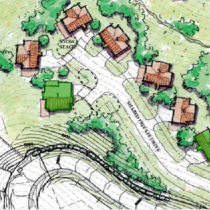Landscape Architecture for Landscape Architects › Forums › GENERAL DISCUSSION › The Unemployment Rate For Landscape Architects/Designers
- This topic has 1 reply, 23 voices, and was last updated 12 years, 10 months ago by
 earthworker.
earthworker.
-
AuthorPosts
-
December 8, 2011 at 1:46 am #159003
 Mark WarrinerParticipant
Mark WarrinerParticipantThe US national unemployment rate is wavering somewhere between 9% and 10%. Does anyone know the unemployment rate for Landscape Architects/Designs?
December 8, 2011 at 4:20 am #159124 earthworkerParticipant
earthworkerParticipantCan we add to that the amount of LA’s working half time or without benefits or on contract basis. Of the 20 or so coworkers let go with me back in 2009 only 3 are working in firms and they are not even at full time. For those of us with 10 years or more experience, is there really any hope of ever finding permanent employment within a firm? have we all been replaced with inexperienced cheap labor straight out of school? I feel like I am watching the funeral of my own career.
December 8, 2011 at 6:16 pm #159123 landplannerParticipant
landplannerParticipantWithin the next 30 days, there will be a several part topical series on this very question, and ones related to it.
Suffice it to say, a random sampling of websites related directly (or indirectly) to all the major design professions, indicate that the same percentages or ratios of design professionals out-of-work since the onslaught of the Great Desperation (it has advanced to that stage) is anywhere between 25% (1 in 4) to 33% (1 in 3). Another general and somewhat reliable ratio out there these days, is that there are upward of four (4) and some decimal fraction to one (1) applicant for every open position now. A barely discernable glow of improvement can be found in that statistic in that it was as high as between 5.5 and 6.0 to 1, well over a year ago. No real comfort to those afflicted.
(1 in 3) . Essentially, marginal or inconsequential improvement. If you factor in those design professionals that were in the public sector and no longer are (estimated upwards of a half-million jobs gone away and not coming back anytime soon by the end of 2011) the numbers are even bleaker.
Having encountered that early on, when the term “Great Recession” had some newness and grotesque appeal to it, is why I have gone overseas to practice. A mixed blessing and curse, believe it.
December 9, 2011 at 12:06 am #159122 Leslie B WagleParticipant
Leslie B WagleParticipantNot directly any help on the main question but LA was not in the top troubled fields listed in this article (maybe we’re too small to be visible?):
http://www.classesandcareers.com/advisor/the-10-worst-college-majors/
December 9, 2011 at 5:43 pm #159121 landplannerParticipant
landplannerParticipantLeslie:
I first thought that when I looked at your hyperlink to the “10 worst college majors” that you had found the one that has been circulating that I believe places architecture right at #1 for now given the beyond dismal employment prospects that show no signs of improving any immediate time soon.
My first response would have been if you had pegged the list I am referring to, that a more wider interpretation for most of the design-related professions (ours for sure to be included- maybe, just maybe less so for civil and structural) would certainly apply to the #1 rating.
December 9, 2011 at 6:47 pm #159120 Leslie B WagleParticipant
Leslie B WagleParticipantI agree we would be yoked to the general planning/architecture area’s current and near-future fate, but I don’t know the best forecast for what that is. Reading the link however, I couldn’t help but notice music therapy being in such bad shape, when not long ago I had been on art therapy discussions (interested due to a relative in that field) and the art therapists were in misery over how music therapists were “so much better organized and recognized” etc. Seems like everyone in a creative realm thinks the grass might be greener somewhere else. In reality, it’s the overall water level. If you aren’t picked as the lead profession for mental health or construction in good times, that won’t reverse in bad times. And even a recovery may take longer to ripple out and benefit specialists, sad to say.
December 10, 2011 at 12:14 am #159119 Alan Ray, RLAParticipant
Alan Ray, RLAParticipantwith a philosophy degree, l guess you could open a philosophy shop….
December 10, 2011 at 1:58 pm #159118 Andrew Garulay, RLAParticipant
Andrew Garulay, RLAParticipantHow do we measure it? Supposedly 21% of us are self employed, 6% work for government, and 51% for “architectural, engineering, and related services”. Where the other 22% are seems a mystery.
Self employed people don’t show up in the unemployment line very often. They just tend to work a whole lot less and sometimes subsidize with a second job. I don’t know how that shows up statistically.
What about all of the people who were laid off and now work in another field? If they are no longer in the field are they part of the statistics?
These numbers are like betting odds or a stock market prospectus. You might have a better grip on your chances, but you win or lose by exactly what opportunities that you find, what you wager, and how the exact game plays out..
January 4, 2012 at 10:54 am #159117 mauiBobParticipant
mauiBobParticipantBy end of 2014, it will be 100% unemployed, because the profession will be obsolete. Prepare for a another career…now or perish!! The Planners, Architects and Engineers are taking over as I see it in my current job.
January 4, 2012 at 3:29 pm #159116 Alan Ray, RLAParticipant
Alan Ray, RLAParticipantmauiBob, they have always tried to take over our jobs….we just have to continue to do our job better than they do. I think a lot of the problem, besides the economy, is the weaker education students are getting now makes our profession doable by anyone….I interviewed some students recently and learned, much to my shock, that they no longer teach planting design or grading and drainage. These were always skills we did better than anyone! It looks like the schools are preping for LEED only, again something anyone can get. I worked seven years as senior LA for a huge AE firm and I held seminars for the architects and engineers before the took their exams on how to site plan and do grading plans…most never had courses in either…So, we need to keep relevant by having unique skills…..what are they teaching that is unique for us now?
January 4, 2012 at 6:46 pm #159115Keith
ParticipantMauiBob is spot on. This “profession” is a disaster for my family and me. I am now praying for a call-back from Petco and my wife, also a licensed landscape architect, is working 20 hours in a retail position. Why would any firm hire a landscape architect when they already have engineers that can legally do everything we can, and more?
We’re over-qualified to be cad jockies due to techinical schools teaching the skill, we’re over-qualified to work at garden centers because anyone with an interest in plants can create a nice garden for less money than we demand, and we’re under-qualified to work for an engineering firm because they have more skills than we do and they don’t care about planting design. I feel like this profession will indeed be obsolete.
January 4, 2012 at 8:19 pm #159114 Leslie B WagleParticipant
Leslie B WagleParticipantThere is another trend….I don’t want to say “ominous” but certainly a challenge, and that is inside 4 year (and even 2 year) horticulture programs. “Way back” when I was starting out, horticulture and LA had a kind of solid dividing line, with more botanical science and maintenance business focus inside horticulture and more history, art, and civil engineering focus inside LA. We all knew that within the green industry, some landscape installation providers would pencil out plans, but mostly for the residential scale. They stopped short of major grading challenges, for example, and most public and corporate funded work would involve an engineering or LA firm (or at least LA as sub consultant).
Lately I’ve run into more what would have been called horticulture curricula being housed in some “environmental” campus department, and also having a concentration in “landscape design” that is quite a bit more elevated than designing planting beds. I doubt it is a complete overlap with LA, but they study with software and even sketch-up. Also there is a big green industry convention in my own town that makes an entire afternoon of instruction available as an option for helping existing businesses learn various forms of software techniques.
The overlap may just lead to better LS contractor output and we should celebrate that, but we also need to be aware that once a project has an engineer, if the landscape contractor can appear to be able to illustrate anything at all attractive (and when are plantings not attractive?), he/she may just seem like a perfectly good rounding out, hence the combination all that is needed. LA’s have to have a message that is positive about where our field will still fit in…..or should we just plan on fusing with that emergent education (upgrade of horticulture) and dissolving away our separate title? We might need to do some course swapping to define the new realm, but it might be good to have a merged bigger population with a combined strong image of “who to turn to” to ensure that LA isn’t wiped out by cost cutting.
January 4, 2012 at 8:20 pm #159113 Leslie B WagleParticipant
Leslie B WagleParticipantBasically I share the same concern. Yet maybe the title & training mixup of LA’s with allied professions could be part of the problem. We have tried to define subcategories in a big area of landscape design, with horticulture, LA, land planning etc. splintering a bunch of people concerned with the same thing. Yes, some are interested in learning types of perennials in depth, others historic landscapes, others mega site layout, etc. But look at engineers by comparison. They also make personal specialty decisions but there are thousands of them and they get a lot of respect because they are trusted to self-select and not go after an aerospace project when they have concentrated on civil. But their combined “clout” keeps them in the driver’s seat even if many would be unqualified by practice in mechanical, environmental, or whatever they haven’t actually worked with. How that has happened might be an interesting inquiry but it doesn’t matter now; we may just need to figure out how to emulate it or all the landscape related splinters might die, which would be a shame. There IS more to know than just renting a truck.
January 4, 2012 at 10:28 pm #159112 Andrew Garulay, RLAParticipant
Andrew Garulay, RLAParticipantHave you tried to work in a civil engineer’s office as civil engineering staff rather than a specialist LA? We can bring a lot to the table in terms of skill set that is very well suited for local civil firms. They do more site planning than anything else. Their interns have more experience measuring vibrations on bridges, compaction from test borings, and calculating the displacement of water by an aircraft carrier than they do drawing site plans.
If you go there to try to sell the idea of having an LA, you’ll get no where. If you go there telling them that you are a site designer (if you have the skills to back it up), you have a shot. If you spent your undergrad time looking at wind turbines, LEED accreditation, and green roofs, few people will care.
Your job opportunities are based on what you studied, what your attitude is, how it fits into what is actually being proposed and built, and your ability to present those skill sets.
I beat out two engineers for my last job and they had almost no interest in my landscape architecture stamp … just my site planning resume. …. and I came out of a civil office before that. My first office job was with a small civil office with no civil experience. I did have lots of time drawing plans in ACAD at school – that was enough.
January 5, 2012 at 8:01 am #159111 Jason T. RadiceParticipant
Jason T. RadiceParticipantFYI, a ‘duh’ article in the Washington comPost:
http://www.washingtonpost.com/business/economy/new-study-shows-arch…
Study found that architecture and arts/humanities degrees have the highest unemployment rates. Nobody building anything = no jobs in architecture. Arts/Humanities degrees always have the highest unemployment rates…so that is not news.
-
AuthorPosts
- You must be logged in to reply to this topic.


